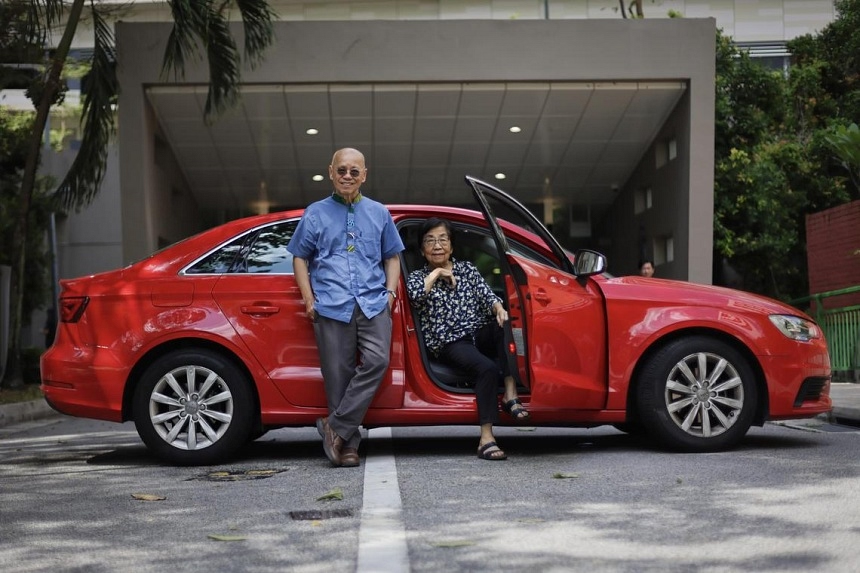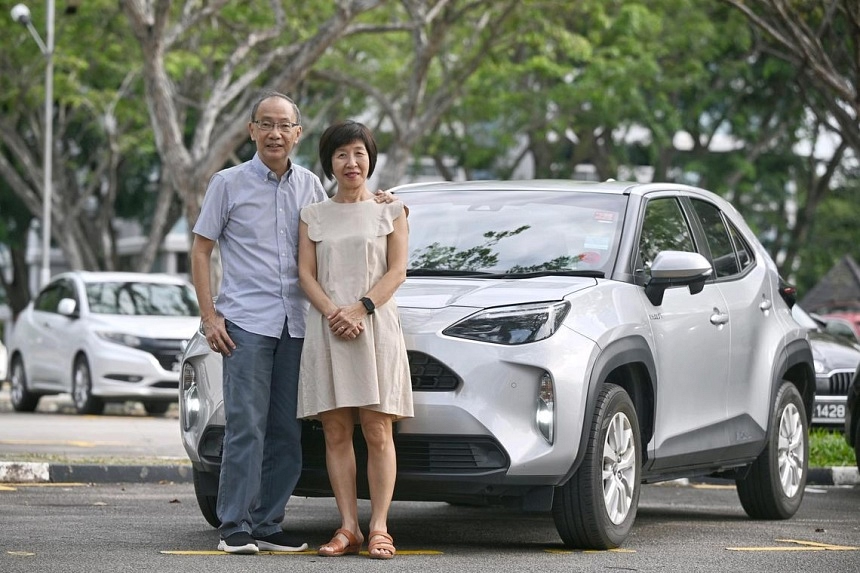November 4, 2024
SINGAPORE – A number of accidents involving elderly drivers in recent months have sparked debate over whether seniors should continue to take the wheel.
In September, at least two elderly drivers were involved in police investigations following separate accidents. One of them, aged 77, was arrested over an accident in Toa Payoh that led to the death of an 83-year-old cyclist. In another case, a 70-year-old driver’s car collided with the rear of a double-decker bus at a Hillview bus stop.
Such accidents often draw hundreds of comments on social media, with netizens sparring over the merit of having a driving cut-off age.
In Singapore, the statutory age limit for taxi, private-hire car and heavy vehicle drivers is 75, but there is no restriction for those who do not drive for a living.
Motorists aged 65 and above, however, must be certified fit to drive by a Singapore-registered doctor once every three years in order to renew their licences.
During the medical test, drivers have to report their medical history to the doctor, who will check for signs of physical disabilities, psychiatric disorder and hearing difficulty, among other things. A vision test and a basic mental impairment test will also be done.
Proponents of a driving age limit say it will be good for road safety, but others call them out for making ageist assumptions and stereotyping. Some also challenge the notion that elderly drivers are to blame for more accidents.
According to the police, the number of fatal accidents involving drivers aged 65 and above, who include motorcyclists and heavy vehicle drivers, has risen from eight in the first six months of 2023, to 11 in the same period in 2024. In comparison, the figure for drivers aged 64 and below fell from 66 to 63.
There was also an increase of about 5 per cent in the number of accidents involving drivers aged 65 and above that resulted in injuries, from 606 in the first half of 2023 to 639 in the first half of 2024. For drivers aged 64 and below, this fell by about 1 per cent.
While it is hard to draw conclusions from a small set of year-on-year data, transport economist Walter Theseira said an uptrend in the number of accidents involving elderly drivers can be expected in the future.
This is “simply because of Singapore’s ageing population, and also because of the increased affluence of our older population, where more are still able to afford cars even in retirement”, said the associate professor from the Singapore University of Social Sciences.
Fit to drive

Dr William Wan, 77, with his wife Ruth, 80. Mrs Wan continues to drive herself and her less mobile friends around for medical appointments and grocery shopping. PHOTO: THE STRAITS TIMES
Five seniors who spoke to The Straits Times acknowledged the concerns about their fitness to drive, but said they want to keep doing so for as long as possible.
“There is no denying that my reflexes are getting slower as I age, but it doesn’t mean that I’m incapable of driving,” said retiree Ruth Wan, 80, who still drives herself and her less mobile friends around for medical appointments and grocery shopping.
But she has adjusted her driving routine for her own safety. While she used to love driving long distances to Malaysia, she has stopped doing so as she gets tired more easily now.
For Mrs Kim Sagadeva, who passed her fourth medical test for licence renewal in 2023, driving is a vital part of her life.
The 75-year-old said those who are certified fit to drive should not be banned from the roads.
“One should never use chronological age to determine another’s ability,” said the regular golfer, adding that she often outperforms those 30 years her junior on the golf course.
Legal requirement
Some have questioned if the current requirement is adequate.
Mr Bernard Tay, chairman of the Singapore Road Safety Council, suggested that elderly drivers, including himself, should voluntarily go for more medical check-ups.
The 75-year-old said seniors who are aware of any impairments that affect their ability to drive should not wait for the mandatory medical examination every three years. “You must take responsibility and go for regular medical check-ups to ensure you are fit to drive.”
Dr Kelvin Goh, medical lead of United Primary Care Network, told ST that doctors have the responsibility to advise patients to stop driving when they develop medical conditions that make them unfit to drive.
If patients do not comply, doctors can report them to the police, while balancing the patient’s right to confidentiality, he said.
“However, one challenge we face is that we are unable to access the National Electronic Health Record for this medical exam as it is not one of the permitted uses,” said Dr Goh. “Hence, we are unsure if the patient’s declaration of his or her medical history is accurate.”
Prof Theseira suggested making the medical test more thorough and rigorous.
For example, it is useful to involve geriatricians – doctors who specialise in treating older adults – in the certification process.
He said medical experts can also weigh in on what other functional tests, such as those for reaction time, should be introduced. But more tests would increase costs for drivers, so a more calibrated approach is needed, he added.
If there is strong evidence that many seniors experience declining capabilities at a certain age, the relevant tests can be phased in at that point.
What other countries do
Some countries have already adopted a phased approach.
In Japan, drivers aged 70 and above have to complete a driving course again before licence renewal. Those aged 75 and older will also be tested on their memory and judgment.
In New South Wales, Australia, drivers aged 75 and above have to pass an annual medical test. Drivers aged 85 and above also have to pass a driving test every two years.
Regional governments across South Korea are offering gift certificates worth 100,000 won (S$100) to 300,000 won to incentivise older drivers to give up their licence.
In May, the central government proposed issuing a conditional licence that would restrict highway access and night-time driving for drivers aged 65 and above, based on their driving capabilities.
The proposal, however, drew a strong public backlash, prompting the government to pledge a review before deciding whether to proceed with it in 2025.
Elderly drivers whom ST spoke to also did not like the ideas mooted by the South Korean authorities.
Retiree James Loo, 75, said banning elderly drivers from highways is an ageist move.
“Should we also ban all motorcyclists from travelling on expressways since there are many fatal motorcycle accidents as well?” he asked, adding that enforcement officers will also have a hard time ensuring compliance.
Self-awareness
Mr Loo, who hits the gym at least four times a week, said the key is for elderly drivers to be self-aware.
“I’m aware that I may be slower than I was before, so I’m a little bit more careful and do not speed or try to beat the red lights while I’m on the road,” he said.
Retiree Tan Peng Ann, who has been driving for over 40 years, shared the same view. “If a driver knows that he has night blindness, he should just not drive at night.”

Mr Tan Peng Ann, 66, who has been driving for over 40 years, with his wife, Madam Linda Tay, 65. He is of the view that elderly drivers have to be self-aware. PHOTO: THE STRAITS TIMES
“It will be difficult for the authorities to police everyone,” the 66-year-old added.
Dr Teo Chiang Wen, an associate consultant with Outram Community Hospital, said elderly drivers can avoid driving on unfamiliar roads at night, and during rush hour or bad weather.
“Planning safe routes with fewer right turns, slower traffic and well-lit streets can make driving less stressful and safer,” said Dr Teo, who looks after elderly patients.
They can also drive a car equipped with power brakes, rear-view cameras and other sensors to help alert them to nearby vehicles, he added.
Warning signs
However, not all elderly drivers are self-aware and can be counted on to give up driving voluntarily. In such cases, their family members have to watch out for warning signs, such as unexplained dents and scratches on their cars, Dr Teo said.
If family members notice that their elderly parents or grandparents are getting lost on familiar routes, having trouble following traffic signals and showing signs of early-stage dementia, they should start a conversation, but approach the topic with care.
“Avoid language that may make seniors feel as though their independence is being taken away. Instead, frame the discussion around their safety and well-being,” Dr Teo said.
“Rather than focusing on ‘loss of privilege’, the conversation can shift towards transitioning to alternative transport options (such as family carpooling, ride-sharing services or public transport) to preserve their independence,” he added.
Temasek Polytechnic gerontology lecturer Geetika Gupta said elderly drivers who are not receptive to family members’ advice can be taken to a doctor or an occupational therapist, who can evaluate their driving abilities objectively.
“Often, hearing the risks from a trusted professional can help them come to terms with the need to reduce or stop driving,” she said.
If they remain resistant to giving up driving, Dr Teo suggested that family members limit the seniors’ access to the car, park it in a less convenient location, or disable the vehicle.
They should also be reminded that their insurance claims will not be entertained if they have been advised by a doctor against driving, he added.
Insurance providers that ST spoke to said they do insure elderly motorists, but only if they are certified medically fit to drive.
The Automobile Association of Singapore and Liberty Insurance, which launched an insurance policy tailored for senior drivers in 2014, said new applications are accepted from drivers up to age 75.
Elderly drivers can cope better if they have emotional support from their loved ones, Ms Gupta said.
“The decision to stop driving may cause feelings of frustration and sadness as it symbolises a loss of independence and autonomy. Families should recognise these feelings and offer support throughout the transition,” she said.


